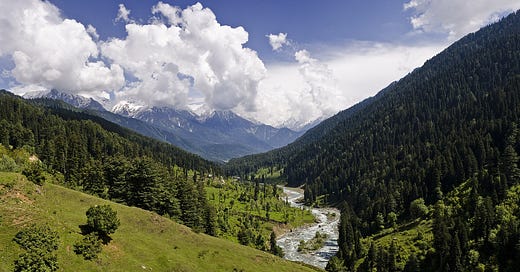Kashmir Ablaze
How State-Sponsored Extremism Risks Regional War, Nuclear Insecurity, and Global Instability
Pakistan’s Weaponization of Terrorism and the Looming Collapse Threat
The Kashmir region is once again on fire. Terrorism is resurging, not merely as isolated incidents but as a deliberate geopolitical instrument to alter regional dynamics. India has openly accused Pakistan — long regarded as the “mother state of terrorism” — of orchestrating renewed violence. In a rare and revealing admission, Pakistan’s own defense leadership has acknowledged the country’s long-standing role in supporting terrorism over the past half-century.
This escalation signifies a dangerous shift: terrorism is now evolving from a tool of proxy warfare into a formal instrument of statecraft, with implications that extend far beyond South Asia.
While the world watches uneasily, China quietly benefits. Beijing has little interest in seeing India emerge as a stable economic power. Pakistan’s destabilizing actions serve China’s broader strategic objective: to weaken India’s credibility as a regional and global economic partner and to constrain its rise as a democratic counterweight to Chinese influence.
Given the current trajectory, two major outcomes are increasingly likely:
First, Pakistan will intensify its use of terrorist proxies, not only in Kashmir but potentially throughout India. In the China-Pakistan strategic framework, India must be portrayed as unstable and incapable of maintaining internal security — a critical narrative to undermine India’s attractiveness to Western allies and investors.
Second, India faces a significant opportunity—and perhaps a necessity—to confront Pakistan decisively. Should a full-scale conflict erupt, Pakistan’s internal divisions would likely deepen. Separatist movements such as the Balochistan Liberation Army (BLA) could gather strength, possibly leading to the emergence of new independent states. Simultaneously, Islamist groups like Tehrik-i-Taliban Pakistan (TTP) may capitalize on the turmoil to seize control of regions like Khyber Pakhtunkhwa.
Pakistan is already economically crippled, with spiraling inflation, severe debt, and widespread social unrest. The internal security apparatus is weakening, and morale within the Pakistani Army is at a historic low. Growing friction between the Inter-Services Intelligence (ISI) and the military command structure only hastens the state’s disintegration.
Meanwhile, Afghanistan — under Taliban control since August 2021 — acts as a destabilizing force. Taliban-ruled Afghanistan now serves as both an ideological beacon and an operational sanctuary for global terrorist movements, emboldening extremist actors throughout South and Central Asia.
If Pakistan collapses, the global community faces an even graver threat: the security of Pakistan’s nuclear arsenal. In the absence of a coherent government, nuclear materials could fall into the hands of terrorist organizations. The prospect of “dirty bombs” being deployed against Western nations — including the United States, the United Kingdom, and European allies — is no longer hypothetical; it is a credible and immediate risk.
Therefore, Pakistan’s denuclearization must become a top international priority before state failure occurs. Achieving this will require unprecedented cooperation among major powers, decisive intelligence operations, and contingency planning that goes beyond traditional diplomatic frameworks.

The situation in Kashmir and Pakistan is no longer a localized conflict — it is fast becoming a global security crisis.
As terrorism becomes a deliberate tool of state strategy, the stakes for the international community rise exponentially.
Proactive, unified action is essential to prevent South Asia from spiraling into a broader, uncontrollable conflict with devastating nuclear consequences.
The time for half-measures is over. The world must act — before the fire spreads beyond control.





Frightening. Thank you so much for writing these. We need to be scared into acting.
Guess a regional nuclear war is one way to finally make Americans care about things that happen beyond our borders.